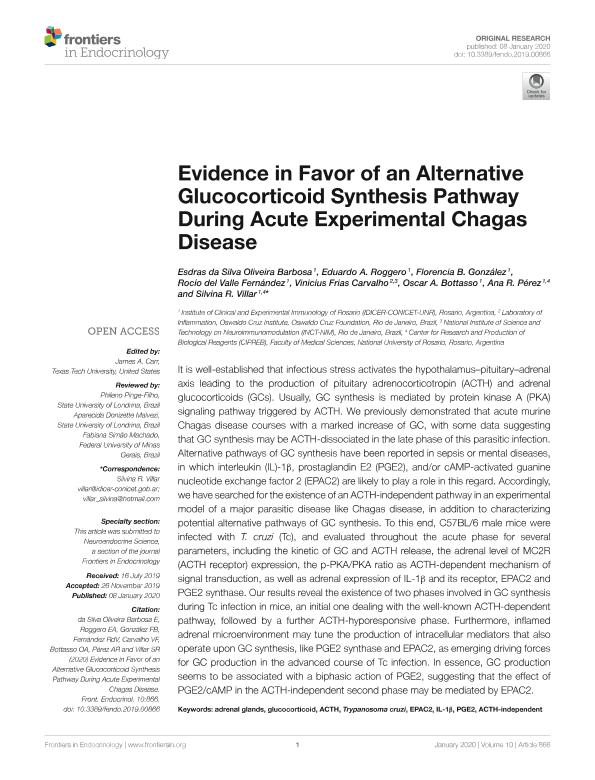Mostrar el registro sencillo del ítem
dc.contributor.author
da Silva Oliveira Barbosa, Esdras
dc.contributor.author
Roggero, Eduardo Angel

dc.contributor.author
González, Florencia Belén

dc.contributor.author
Fernández, Rocío del Valle

dc.contributor.author
Carvalho, Vinicius Frias
dc.contributor.author
Bottasso, Oscar Adelmo

dc.contributor.author
Perez, Ana Rosa

dc.contributor.author
Villar, Silvina Raquel

dc.date.available
2021-11-02T10:48:42Z
dc.date.issued
2020-01
dc.identifier.citation
da Silva Oliveira Barbosa, Esdras; Roggero, Eduardo Angel; González, Florencia Belén; Fernández, Rocío del Valle; Carvalho, Vinicius Frias; et al.; Evidence in Favor of an Alternative Glucocorticoid Synthesis Pathway During Acute Experimental Chagas Disease; Frontiers Media; Frontiers in Endocrinology; 10; 1-2020; 1-9
dc.identifier.issn
1664-2392
dc.identifier.uri
http://hdl.handle.net/11336/145674
dc.description.abstract
It is well-established that infectious stress activates the hypothalamus–pituitary–adrenal axis leading to the production of pituitary adrenocorticotropin (ACTH) and adrenal glucocorticoids (GCs). Usually, GC synthesis is mediated by protein kinase A (PKA) signaling pathway triggered by ACTH. We previously demonstrated that acute murine Chagas disease courses with a marked increase of GC, with some data suggesting that GC synthesis may be ACTH-dissociated in the late phase of this parasitic infection. Alternative pathways of GC synthesis have been reported in sepsis or mental diseases, in which interleukin (IL)-1β, prostaglandin E2 (PGE2), and/or cAMP-activated guanine nucleotide exchange factor 2 (EPAC2) are likely to play a role in this regard. Accordingly, we have searched for the existence of an ACTH-independent pathway in an experimental model of a major parasitic disease like Chagas disease, in addition to characterizing potential alternative pathways of GC synthesis. To this end, C57BL/6 male mice were infected with T. cruzi (Tc), and evaluated throughout the acute phase for several parameters, including the kinetic of GC and ACTH release, the adrenal level of MC2R (ACTH receptor) expression, the p-PKA/PKA ratio as ACTH-dependent mechanism of signal transduction, as well as adrenal expression of IL-1β and its receptor, EPAC2 and PGE2 synthase. Our results reveal the existence of two phases involved in GC synthesis during Tc infection in mice, an initial one dealing with the well-known ACTH-dependent pathway, followed by a further ACTH-hyporesponsive phase. Furthermore, inflamed adrenal microenvironment may tune the production of intracellular mediators that also operate upon GC synthesis, like PGE2 synthase and EPAC2, as emerging driving forces for GC production in the advanced course of Tc infection. In essence, GC production seems to be associated with a biphasic action of PGE2, suggesting that the effect of PGE2/cAMP in the ACTH-independent second phase may be mediated by EPAC2.
dc.format
application/pdf
dc.language.iso
eng
dc.publisher
Frontiers Media

dc.rights
info:eu-repo/semantics/openAccess
dc.rights.uri
https://creativecommons.org/licenses/by-nc-sa/2.5/ar/
dc.subject
ACTH
dc.subject
ACTH-INDEPENDENT
dc.subject
ADRENAL GLANDS
dc.subject
EPAC2
dc.subject
GLUCOCORTICOID
dc.subject
IL-1Β
dc.subject
PGE2
dc.subject
TRYPANOSOMA CRUZI
dc.subject.classification
Inmunología

dc.subject.classification
Medicina Básica

dc.subject.classification
CIENCIAS MÉDICAS Y DE LA SALUD

dc.title
Evidence in Favor of an Alternative Glucocorticoid Synthesis Pathway During Acute Experimental Chagas Disease
dc.type
info:eu-repo/semantics/article
dc.type
info:ar-repo/semantics/artículo
dc.type
info:eu-repo/semantics/publishedVersion
dc.date.updated
2021-09-06T21:06:55Z
dc.journal.volume
10
dc.journal.pagination
1-9
dc.journal.pais
Reino Unido

dc.journal.ciudad
Bristol
dc.description.fil
Fil: da Silva Oliveira Barbosa, Esdras. Universidad Nacional de Rosario; Argentina
dc.description.fil
Fil: Roggero, Eduardo Angel. Universidad Nacional de Rosario; Argentina
dc.description.fil
Fil: González, Florencia Belén. Consejo Nacional de Investigaciones Científicas y Técnicas. Centro Científico Tecnológico Conicet - Rosario. Instituto de Inmunología Clinica y Experimental de Rosario. Universidad Nacional de Rosario. Facultad de Ciencias Médicas. Instituto de Inmunología Clinica y Experimental de Rosario; Argentina
dc.description.fil
Fil: Fernández, Rocío del Valle. Consejo Nacional de Investigaciones Científicas y Técnicas. Centro Científico Tecnológico Conicet - Rosario. Instituto de Inmunología Clinica y Experimental de Rosario. Universidad Nacional de Rosario. Facultad de Ciencias Médicas. Instituto de Inmunología Clinica y Experimental de Rosario; Argentina
dc.description.fil
Fil: Carvalho, Vinicius Frias. Fundación Oswaldo Cruz; Brasil
dc.description.fil
Fil: Bottasso, Oscar Adelmo. Consejo Nacional de Investigaciones Científicas y Técnicas. Centro Científico Tecnológico Conicet - Rosario. Instituto de Inmunología Clinica y Experimental de Rosario. Universidad Nacional de Rosario. Facultad de Ciencias Médicas. Instituto de Inmunología Clinica y Experimental de Rosario; Argentina
dc.description.fil
Fil: Perez, Ana Rosa. Consejo Nacional de Investigaciones Científicas y Técnicas. Centro Científico Tecnológico Conicet - Rosario. Instituto de Inmunología Clinica y Experimental de Rosario. Universidad Nacional de Rosario. Facultad de Ciencias Médicas. Instituto de Inmunología Clinica y Experimental de Rosario; Argentina
dc.description.fil
Fil: Villar, Silvina Raquel. Consejo Nacional de Investigaciones Científicas y Técnicas. Centro Científico Tecnológico Conicet - Rosario. Instituto de Inmunología Clinica y Experimental de Rosario. Universidad Nacional de Rosario. Facultad de Ciencias Médicas. Instituto de Inmunología Clinica y Experimental de Rosario; Argentina
dc.journal.title
Frontiers in Endocrinology
dc.relation.alternativeid
info:eu-repo/semantics/altIdentifier/doi/http://dx.doi.org/10.3389/fendo.2019.00866
Archivos asociados
